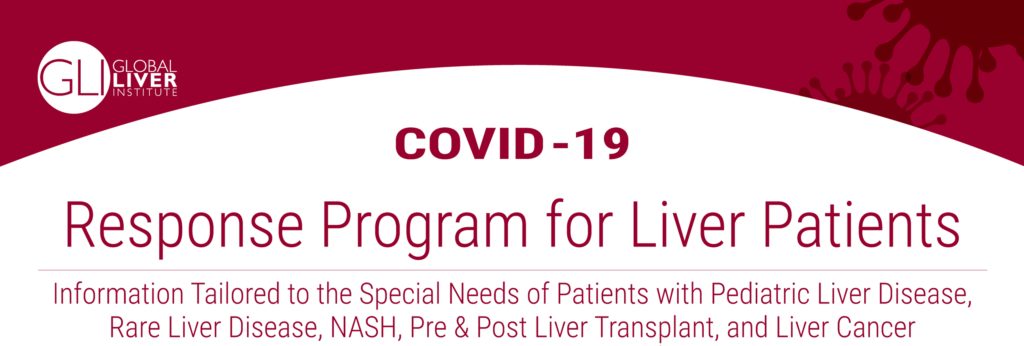
The Global Liver Institute (GLI) has been consistent, since March 2020, in advocating for the prioritization of liver patients, cancer patients, transplant recipients, and those with compromised immune systems in research, healthcare, and vaccine allocation strategies. We have taken data and policy from Israel, France and the United Kingdom in creating a pathway for people living with compromised immune systems to access the vaccine regimen that would allow them a chance at the same level of protection against COVID-19 and the more transmissible Delta variant as their neighbors.
Below is a Q&A based on questions and concerns we have heard from our patient and caregiver community members as well as a glossary of terms we hope you find helpful. Please submit more questions to covid19@globalliver.org.
We also look forward to addressing issues facing patients during the pandemic when GLI LIVE comes back from summer hiatus. For past episodes, see Global Liver Institute on YouTube.
Note from Donna Cryer, GLI CEO, a 27-year liver transplant recipient. For those wanting to know more about my personal experiences and choices as a person on multiple immunosuppressant medications for inflammatory bowel disease (IBD) and anti-organ rejection, here you go:
- I am participating in the Johns Hopkins Transplant Vaccine Effectiveness Study and a UNC IBD Vaccine Effectiveness Study
- I had zero antibodies after two vaccine doses as measured by a semi-quantitative lab test.
- I did get a third shot of a different mRNA and had a 24-hour period of tiredness and achiness (yeah!).
- I contribute information to the Centers for Disease Control and Prevention v-safe system to inform the national response on COVID-19.
Q&A
The U.S. Food and Drug Administration (FDA) and Centers for Disease Control and Prevention (CDC) have approved a third dose of the COVID-19 vaccine for immunocompromised patients who received a messenger RNA (mRNA) vaccine (Moderna or Pfizer). GLI applauded these actions immediately and then moved to the hard work of sharing the information, helping to update guidelines, ensuring equitable access, and strategizing on behalf of those patients left out of this round.
Here are some commonly asked questions and answers:
Why is a third shot being recommended?
The approximately seven million U.S. adults who are immunocompromised are more likely to get severely ill from COVID-19 and more likely to get breakthrough infections than their immunocompetent peers. Immunocompromised individuals have 59 percent to 72 percent vaccine effectiveness after a second dose, compared with 90 percent to 94 percent among non-immunocompromised people. Emerging experimental and observational data in adults suggest that an additional mRNA COVID19 vaccine dose in immunocompromised people enhances antibody response and increases the proportion who respond to COVID-19 vaccine. Among those who had no detectable antibody response to an initial mRNA vaccine series, 33 percent to 50 percent developed an antibody response to an additional dose.
Who is considered immunocompromised and should get a third shot?
The CDC list includes those who have:
- Been receiving active cancer treatment for tumors or cancers of the blood
- Received an organ transplant and are taking medicine to suppress the immune system
- Received a stem cell transplant within the last two years or are taking medicine to suppress the immune system
- Moderate or severe primary immunodeficiency (such as DiGeorge syndrome, Wiskott-Aldrich syndrome)
- Advanced or untreated HIV infection
- Active treatment with high-dose corticosteroids or other drugs that may suppress your immune response
The recommendation is limited to adults 18 and older for the Moderna vaccine because that vaccine has not been authorized for adolescents as of yet. The Pfizer vaccine is authorized for adolescents 12 and older and adults. The FDA has granted full approval of the Pfizer vaccine for those 16 years of age and older. The vaccine also continues to be available under emergency use authorization, including for individuals 12 through 15 years of age and for the administration of a third dose in certain immunocompromised individuals.
I have a chronic disease that also makes me vulnerable to severe COVID-19. Should I get a third shot?
For now, an additional shot is recommended only for people who meet the CDC’s criteria for being immunocompromised. Whether those with chronic diseases should get a third shot is under review. Those with certain chronic diseases are at risk of getting more severely ill from COVID-19 than others. The two-shot vaccination dose, wearing a mask, and social distancing are recommended for those with certain chronic conditions. President Biden proposed a third vaccine dose for the general population. The details are under development.
I received the Johnson & Johnson vaccine – should I get another shot?
It would seem reasonable that since the one-dose Johnson & Johnson vaccine has shown slightly less effectiveness in immunocompetent people that there would be a need for an additional shot for those who have compromised immune systems. However, currently, there is not a recommendation for additional vaccination for Johnson & Johnson vaccine recipients. That may change as new information becomes available.
Does the third shot need to match my previous two mRNA vaccines?
There is currently limited data regarding “mixing and matching” vaccines. It is currently recommended that attempts be made to match the additional dose type to the mRNA primary series; however, if you cannot get an appointment scheduled for the same vaccine, it is okay to get the other vaccine.
When should I receive my third dose of the COVID-19 vaccine?
At least 28 days after your second dose of mRNA vaccine. If you had your transplant within the last three months or recently had an episode of rejection, please contact your provider.
Should I receive a third dose of vaccine if I’ve had COVID-19?
You should still receive the vaccine if you have been previously diagnosed with COVID-19. Please check with your provider about timing.
Where should I go for my third dose of vaccine?
Contact your local pharmacy or primary care doctor to schedule your third dose of vaccine.
Do I need to bring proof of my medical history?
No. In the effort to rapidly vaccinate as many immunocompromised patients as possible, proof of medical history is not required to receive a third dose of vaccine.
How effective is a third dose in transplant recipients?
A recent randomized clinical trial published data indicating that when compared to placebo, a third dose of vaccine resulted in higher rates of antibody formation and more CD4+ T cell formation against COVID-19 (https://www.nejm.org/doi/full/10.1056/NEJMc2111462). This study did not evaluate patient outcomes, such as rates of COVID-19 or hospitalizations.
Will I be completely protected from COVID-19 infection if I get a third shot?
You will be safer but still at risk for COVID-19 and its variants. You will be better protected from severe disease and hospitalization but still may have an asymptomatic or symptomatic infection and would be able to spread the disease to others. Think of carrying an umbrella in a rainstorm. You may still get wet but are far less likely to get drenched. You should continue to take safety precautions such as masking and distancing and should ensure that everyone in your close circle of contacts gets vaccinated and takes similar precautions.
As an immunocompromised person, am I at risk for getting COVID-19 from the vaccine?
No. A mRNA vaccine does not use the live virus that causes COVID-19. The vaccine is recommended for immunocompromised individuals as a measure of protection against COVID-19. The Pfizer and Moderna vaccines use the mRNA technology. Communications from transplant centers have stated that a third dose of vaccine outweighs any theoretical risks, given that transplant patients have worse outcomes from COVID-19 infection compared to non-transplant recipients.
Is monoclonal antibody treatment an answer for those who still don’t have a strong immune response to the vaccines?
The FDA recommends that immunocompromised individuals discuss monoclonal antibody treatment options with their health care provider, should they contract or be exposed to COVID-19. The FDA has issued an emergency use authorization of monoclonal antibody treatment for mild to moderate COVID-19 to keep high risk patients with COVID-19 out of the hospital. Monoclonal antibodies are laboratory-made proteins that mimic the immune system’s ability to fight off harmful antigens such as viruses.The FDA is carefully monitoring circulating viral variants and their sensitivity to monoclonal antibodies authorized to treat COVID-19.
How can I help contribute to research so that scientists, public health officials and policymakers can make the best decisions about patients like me?
Johns Hopkins Medicine is conducting such a study to lead to a better understanding of how effectively the vaccine can help patients get COVID-19 immunity. Please see https://vaccineresponse.org/ for more information. Cancer patients may consider the following study at Mayo Clinic https://www.mayo.edu/research/clinical-trials/cls-20509687
Additional Resources
U.S. Centers for Medicare and Medicaid Services on monoclonal antibodies:
https://www.cms.gov/medicare/covid-19/monoclonal-antibody-covid-19-infusion
U.S. Centers for Disease Control and Prevention, Advisory Committee on Vaccine Practices:
https://www.cdc.gov/vaccines/acip/index.html
American Society of Transplantation: Updated 8/13/21
https://www.myast.org/covid-19-information
American Association for the Study of Liver Diseases:
https://www.aasld.org/about-aasld/covid-19-and-liver
European Association for the Study of the Liver:
https://easl.eu/covid-19-and-the-liver/
Sources
Centers for Disease Control and Prevention, including Advisory Committee on Immunization Practices presentation, August 13, 2021
MedStar Georgetown University Hospital recommendations to transplant patients
Experts interviewed by National Public Radio for a things to know feature
FDA news release on monoclonal antibody treatment, news release on authorizing an additional vaccine dose for certain immunocompromised individuals


